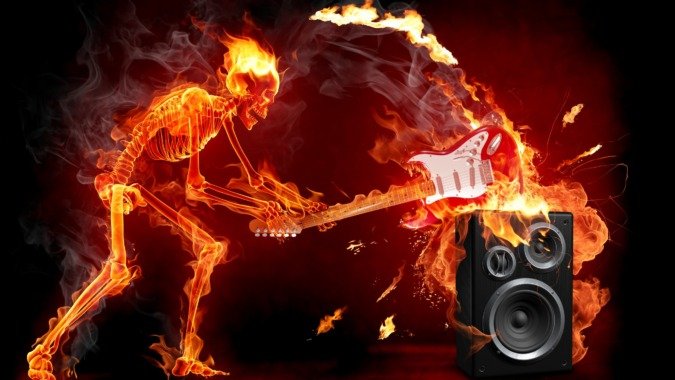
“Metal as hell,” a phrase often bandied about but rarely dissected, has permeated American culture, finding its way into conversations, social media, and even mainstream media. But what exactly does it mean? And how did this powerful expression, rooted in heavy metal music, transcend its genre to become a cultural touchstone?
Table of Contents
From Music to Symbol: The Genesis of “Metal as Hell”
The seeds of “metal as hell” were sown in the fertile ground of heavy metal music, a genre born from the industrial grit of Birmingham, England, in the late 1960s. Heavy metal, with its distorted guitars, pounding drums, and rebellious spirit, resonated with fans for its celebration of individualism, defiance, and a certain dark romanticism.
It was during the genre’s golden age, the 1980s, that the phrase “metal as hell” likely emerged. Initially, it served as a descriptor for music that pushed the boundaries of sonic aggression and embodied the raw power and intensity that resonated with fans.
Beyond the Mosh Pit: “Metal as Hell” Enters the Lexicon
Over time, “metal as hell” transcended its musical origins and entered the broader American slang lexicon. It became a versatile term used to describe anything exceptionally intense, badass, or rebellious, regardless of its connection to heavy metal music.
- How to Switch Car Insurance Companies Without a Hassle
- Spinning a Yarn of Fun: The Pin Up Betting Platform Ultimate Review
- Secrets of Creating Ultimate Man’s Cave
- Experience Pure Audio Bliss with OnePlus This World Music Day
- Kroll’s Celebrity Brand Valuation Report: Virat Kohli Reclaims Top Spot
This evolution allowed the phrase to be applied to a wide range of situations and experiences, including:
- Acts of defiance: A person standing up to authority despite potential consequences could be described as “metal as hell.”
- Exceptional courage: A firefighter rescuing someone from a burning building could be deemed “metal as hell.”
- Unconventional art: A film or painting that challenges societal norms and embraces rawness could be considered “metal as hell.”
- Awe-inspiring nature: A powerful storm or a breathtaking mountain vista could evoke a sense of “metal as hell.”
- Chaotic situations: A thrilling sporting event or a raucous concert could be described as “metal as hell.”

Beyond the Literal: Exploring the Nuances of “Metal as Hell”
The specific connotations of “metal as hell” can vary depending on the context and the speaker’s intent. In some cases, it can be a genuine expression of admiration for something truly extraordinary. In others, it can be used ironically or playfully.
This nuanced usage reflects the evolving nature of heavy metal itself. As the genre has diversified and incorporated new influences, the definition of “metal” has become less rigid and more open to interpretation. This allows the phrase to be applied to a wider range of experiences and expressions, enriching its cultural significance.
A Symbol of Strength and Individuality: The Lasting Power of “Metal as Hell”
Whether used literally or figuratively, “metal as hell” serves as more than just a catchy phrase. It captures the essence of a cultural movement that has resonated with generations of fans and continues to do so. It is a celebration of individuality, strength, and the refusal to conform to societal expectations.
In a world increasingly defined by conformity and homogeneity, “metal as hell” stands as a potent symbol of rebellion and nonconformity. It reminds us that true strength lies not in following the crowd, but in embracing our individuality and standing up for what we believe in, even when it means going against the grain.
As long as the human spirit continues to yearn for freedom, individuality, and the power to push boundaries, “metal as hell” will remain a relevant and powerful expression. Whether you’re a headbanger at a heavy metal concert or simply someone who appreciates the raw power of the phrase, “metal as hell” is a reminder that within each of us lies the potential to be truly badass.
Beyond Words: The Cultural Impact of “Metal as Hell”
The influence of “metal as hell” extends far beyond the realm of music and slang. It has permeated various aspects of American culture, including:
- Fashion: From ripped jeans and leather jackets to band T-shirts and heavy metal-inspired jewelry, the aesthetic associated with “metal as hell” has become a mainstream fashion trend.
- Film and television: Films like “Mad Max: Fury Road” and television shows like “Stranger Things” have incorporated elements of heavy metal culture and the “metal as hell” ethos into their narratives.
- Gaming: Video games like “Doom” and “Heavy Metal: Geomatrix” have embraced the dark, intense, and rebellious spirit of “metal as hell.”
- Art: Paintings, sculptures, and other artistic expressions have drawn inspiration from the themes and imagery associated with heavy metal and “metal as hell.”
Frequently Asked Questions About Metal Music
1. What is metal music? Metal music is a genre characterized by its heavy, aggressive sound, distorted guitars, powerful drumming, and often complex song structures. It emerged in the late 1960s and has since evolved into various subgenres, each with its own distinctive traits.
2. What are the main subgenres of metal? Metal has numerous subgenres, including but not limited to Heavy Metal, Thrash Metal, Death Metal, Black Metal, Power Metal, Doom Metal, and Progressive Metal. Each subgenre has its own unique musical elements, themes, and influences.
3. What distinguishes metal from other music genres? Metal is distinguished by its heavy and intense sound, characterized by distorted guitars, fast tempos, and powerful vocals. It often explores darker themes such as fantasy, mythology, and rebellion, setting it apart from more mainstream genres.
4. How did metal music originate? Metal has roots in blues and rock music. Bands like Black Sabbath are often credited with pioneering the genre in the early 1970s. Over time, metal has evolved and diversified, giving rise to various subgenres and a global metal community.
5. Are there common lyrical themes in metal music? Metal lyrics often explore a wide range of themes, including fantasy, mythology, social issues, personal struggles, and sometimes darker or occult subjects. The diversity of lyrical content is reflective of the broad spectrum of subgenres within the metal genre.
6. What is the significance of the imagery in metal, such as album artwork? Metal is known for its distinctive and often elaborate album artwork. This visual aspect complements the music, conveying themes of fantasy, darkness, and rebellion. The imagery contributes to the overall experience and identity of each subgenre.
7. How has metal music evolved over the years? Metal has undergone significant evolution, with bands experimenting and pushing boundaries within the genre. Subgenres have emerged, incorporating elements from other musical styles. The evolution of technology has also influenced the production and accessibility of metal music.
8. What is the metal community like? The metal community is diverse and global. Fans, known as metalheads, often share a strong sense of camaraderie at concerts and festivals. Despite the genre’s intense sound, the community is welcoming, and a passion for metal fosters a sense of belonging among fans.
9. Can you recommend some iconic metal bands? Certainly! Some iconic metal bands include Black Sabbath, Metallica, Iron Maiden, Slayer, Megadeth, Judas Priest, and Pantera. Exploring different subgenres will introduce you to a vast array of influential and innovative bands.
10. How can I get into metal music if I’m new to the genre? Start by exploring classic albums from foundational bands like Black Sabbath and Iron Maiden. Listen to different subgenres to find what resonates with you. Attend local metal concerts, watch documentaries, and engage with the global metal community online to discover new bands and gain insights into the genre’s rich history.
Check out some of our amazing web stories.
Related posts:
- 6 Ways To Cope With Emotional Trauma
- Unraveling the Conclusion of ‘Reptile’: The Chilling Climax Explained
- The Ultimate Guide to Travel Hacks for Budget Explorers
- Mastering Your Finances: A Millennial’s Guide
- Love in 2024: Mastering the Dating Game and 2024 Dating Trends
- Victoria and David Beckham Love Story: A Romantic Timeline











